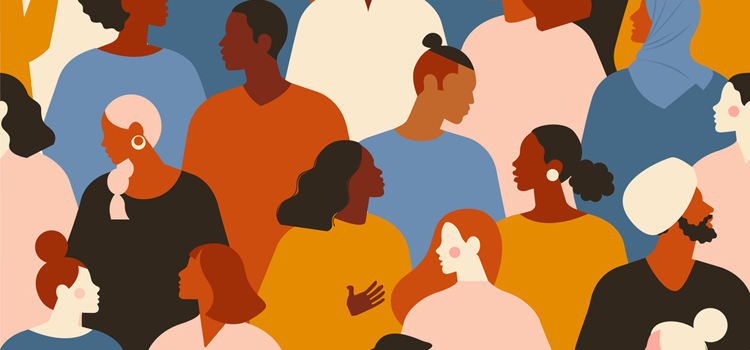YOUTH GROUP LESSON ON RACISM (1 OF 4)

This lesson is the result of a collaborative effort of 100+ youth ministry leaders from around the world, and the extensive work of our writing team.
We’ve spent weeks listening to youth leaders on Zoom calls, researching the topic, asking others their personal experiences regarding racism, and praying about what direction to take.
This is one of four free lessons on racism that we’ll publish. We recognize this is a comprehensive and complex issue, and it’s not realistic to address everything in 4 lessons. But it is a start. Once these are complete, we’ll create more.
Our goal is to help you start the conversation in your youth group. We want to help you teach students what the Bible has to say about racism, and how they can align their lives accordingly.
I hope this lesson is a valuable resource for your youth group.
Nick Diliberto, Ministry to Youth
Note: As mentioned above, this is the first of 4 lessons on racism. Check out the other three lessons here:
Looking for youth ministry curriculum? Check out the…
4TH OF JULY BUNDLE – Save 75% on 8 youth ministry series, 2 junior high series and 15 back to school games. Only available through Thursday, July 10!

YOUTH GROUP LESSON ON RACE – WHAT IS RACISM? (1 OF 4)
DOWNLOAD THE PDF OF THIS LESSON
This lesson was written by Natasha Menifee. Natasha is a writer, teacher and serves as the Christian Education Director at First Baptist Church, Winchester, Kentucky. She holds two master’s degrees from Georgetown College in Learning & Behavior Disorders and Teacher Leadership. She is the proud mother of two daughters.
Bible: Luke 10:25-37; Ephesian 2:10; James 2:1-9; Jeremiah 17:9-10
Bottom Line: God created mankind as one race, the human race. Each person is special and a unique masterpiece that represents His love.
I would like to start today’s lesson by asking this question:
What is racism?
Depending on who you ask and what their experiences are, the definition of racism can vary.
We asked youth ministry leaders across the country this question. Here are some of their responses:
- Racism is a prejudice rooted in ignorance.
- Everyone has a different perspective that is relative to their situation. On a basic level, racism occurs when one ethnic group believes another group is inferior. Then, they project those beliefs on other people.
- It’s an unintentional, subtle, unsaid feeling that one group is less than or not as good as another group.
- Racism is about the systems of power that handicap a particular group of people.
- It’s subliminal. IT (racism) happens every day to people of color everywhere we go.
- Using broad strokes to define any race.
As you can see, people define racism in many ways, but there is a common thread within all of them – the dominance of one group over another in their thoughts, words, and deeds. This lesson will help define racism and the progression of feelings and attitudes that build up to it.
ICEBREAKER: TELL YOUR STORY
(This activity can be done online or in-person.)
Objectives:
- Help students explore how they first became aware of prejudice and discrimination and the feelings associated with their awareness.
- Encourage students to recognize that everyone has experienced prejudice and discrimination. Help them understand that it comes in a variety of forms (not just racial).
Activity Description:
Divide students into small groups of no more than six members. Allow each participant to have the opportunity to relate to four situations. (If using an online platform such as Zoom, utilize breakout rooms to create small groups.)
If your youth group is less than five or six students, use each situation as a starting point for a discussion.
- A time you have experienced prejudice or discrimination.
- A time you have discriminated against somebody else.
- A time you have witnessed discrimination and did nothing about it.
- A time you have witnessed discrimination and did something about it.
Come back together and share observations within the large group. If you think it is needed, ask each individual’s permission before sharing their specific experience.
Although a variety of experiences will be shared, spend more time discussing the last two situations.
Then, ask: What leads us to ignore or stand against discrimination?
Leader Notes:
- Students may be hesitant to share at first, especially if a story is about how they have discriminated against someone else.
- A good strategy is to tell your own story first. This act will build trust and open the door for others to feel safe. Help students understand that sharing stories about discrimination may be uncomfortable, but it provides an opportunity for personal growth.
TEACH
The stories we just shared help us see the different experiences we have had regarding prejudice and discrimination.
When we engage in conversations, thinking, and behaviors that do not treat others with the honor, love, and respect, God created us to have for each other, we are operating in sin.
Therefore, we can define racism as sin. Jesus addressed the concept of prejudice and the cruel treatment of certain ethnic and cultural groups in the parable of the Good Samaritan.
A parable is a simple story used to illustrate a moral or spiritual lesson.
Let me give you some Biblical context concerning the relationship between the Jews and Samaritans.
There had been an intense hatred between Jews and Samaritans dating back centuries.
After the Assyrian captivity of the northern kingdom, certain people from the nation of Israel stayed behind. The invaders then brought in Gentile colonists to resettle the land.
The foreigners brought their pagan idols with them, which the remaining Jews began to worship alongside the God of Israel.
The Samaritans had their own unique copy of the first five books of Scripture as well as their own unique system of worship. These people intermarried with the Assyrians producing the Samaritans – half-Jew, half-Gentile.
The full-blooded, monotheistic Jews detested the mixed marriages and worship of their northern cousins.
At the time of Jesus, the Jews and the Samaritans did not interact well with one another. However, Jesus ministered to the people of Samaria, preaching the good news to them.
It is not the person from the radically different culture on the other side of the world that is hardest to love, but rather the nearby neighbor whose skin color, language, rituals, values, ancestry, history, and customs are different from your own.
Read Luke 10:25-37 – The Parable of the Good Samaritan.
Then an expert in the law stood up to test him, saying, “Teacher, what must I do to inherit eternal life?”
“What is written in the law?” he asked him. “How do you read it?” He answered, “Love the Lord your God with all your heart, with all your soul, with all your strength, and with all your mind,” and “your neighbor as yourself.”
“You’ve answered correctly,” he told him. “Do this and you will live.” But wanting to justify himself, he asked Jesus, “And who is my neighbor?”
Jesus took up the question and said, “A man was going down from Jerusalem to Jericho and fell into the hands of robbers. They stripped him, beat him up, and fled, leaving him half dead. A priest happened to be going down that road.
When he saw him, he passed by on the other side. In the same way, a Levite, when he arrived at the place and saw him, passed by on the other side. But a Samaritan on his journey came up to him, and when he saw the man, he had compassion.
He went over to him and bandaged his wounds, pouring on olive oil and wine. Then he put him on his own animal, brought him to an inn, and took care of him.
The next day he took out two denarii, gave them to the innkeeper, and said, ‘Take care of him. When I come back I’ll reimburse you for whatever extra you spend.’
“Which of these three do you think proved to be a neighbor to the man who fell into the hands of the robbers?”
“The one who showed mercy to him,” he said. Then Jesus told him, “Go and do the same.”
The Jews and Samaritans faced the same problem our society faces today. They did not view each other as one race – the human race. Instead, they focused on their differences.
Society defines race by differences in skin color, hair, and other physical characteristics. They define ethnicity by culture, religion, language, etc. But this type of thinking is wrong.
Within the race of people God created, there are different ethnic groups of people who have various cultural behaviors, beliefs, and norms. But there is only one race, the human race created by God in Genesis.
So then, as a believer, my relationship with God through Christ becomes my identifying factor, not the color of my skin. I am not a black Christian, white Christian, or Hispanic Christian. I am a CHRISTIAN who happens to be of a particular ethnicity.
When we begin to look at the world through the lens of the Bible, our thoughts and actions change. When the things we think, say and do, do not please God, we are sinning.
- If the thoughts I have about a group of people are not pleasing to God, it is a sin.
- If the words I say about a group of people are not pleasing to God, it is a sin.
- If the actions I take against a group of people are not pleasing to God, it is a sin.
As Christians, we are commanded to love God with our hearts, souls, minds, and strengths and our neighbors as ourselves. Our capacity to love and get along with others is connected to our love for God.
Loving our neighbor does not mean we agree with everything they do. It means we love them the way Christ loves them. We treat people the way Christ treats them. We see them, the way Christ sees them.
Read Ephesians 2:10.
For we are God’s handiwork, created in Christ Jesus to do good works, which God prepared in advance for us to do.
Do you know what famous paintings are often called? Masterpieces!
We are God’s work of art. We are His masterpieces, designed for good things.
If I were to paint a picture and try to sell it, it might not bring in much money, if any at all. Possibly because no one knows who I am as an artist or even recognizes my name. But a painting by Michelangelo or Leonardo da Vinci could sell for millions.
Why? Because they are famous artists with a reputation for producing great works. Their names add value and worth to the artwork.
God is more famous than any artist, and His name is above every name. So, if the Master Creator formed us, no one on earth could tell us that we are not valuable.
Our worth and value are connected to the One who created us. Our identity, and what makes us feel important, is given to us by God. We are his masterpieces. A work of art. Beautiful and magnificent as-is.
Read James 2:1-9.
My brothers and sisters, believers in our glorious Lord Jesus Christ must not show favoritism. Suppose a man comes into your meeting wearing a gold ring and fine clothes, and a poor man in filthy old clothes also comes in.
If you show special attention to the man wearing fine clothes and say, “Here’s a good seat for you,” but say to the poor man, “You stand there” or “Sit on the floor by my feet,” have you not discriminated among yourselves and become judges with evil thoughts?
Listen, my dear brothers and sisters: Has not God chosen those who are poor in the eyes of the world to be rich in faith and to inherit the kingdom he promised those who love him? But you have dishonored the poor.
Is it not the rich who are exploiting you? Are they not the ones who are dragging you into court? Are they not the ones who are blaspheming the noble name of him to whom you belong?
If you really keep the royal law found in Scripture, “Love your neighbor as yourself,” you are doing right.
But if you show favoritism, you sin and are convicted by the law as lawbreakers.
James reminds us that we are to treat people the way God does. We are to love our neighbor as ourselves. When we favor people based on their gender, finances, ethnic, or cultural group over another, we are not showing behavior that reflects God’s love for all humanity. He does not favor one set of people over another, and neither should we.
Read Jeremiah 17:9-10.
The heart is deceitful above all things and beyond cure. Who can understand it? “I the Lord search the heart and examine the mind, to reward each person according to their conduct, according to what their deeds deserve.”
Does that verse make you think about your own heart? It should. Here Jeremiah reminds us that we cannot fool God because He knows our heart.
The root of racism forms in the heart because the heart is the place where sin begins. So, when we recognize racism for what it is, sin, we can overcome it like all other sins, through the Word of God.
We may fool others or ourselves, but our true feelings, attitudes, and beliefs about others cannot be hidden from God.
Maybe you are not pretending or hiding your true feelings about people who are not like you. Maybe you are very outspoken and open about what you have learned and come to believe.
And if so, that’s great! But maybe you have some room to grow in this area.
Wherever you find yourself on the matter of racism, ask God to search your heart. Allow Him to show you areas that you need to adjust your beliefs and behavior toward others.
This is not always easy, and it may cause you to discover things about yourself you don’t like. But that’s okay. The goal is to grow and become more like Jesus.
End lesson.
Break up into small groups and discuss the below questions.
Small Group Discussion Questions:
- Why is it important to define racism as sin?
- How does our society promote racial division?
- Can you think of any modern-day parallels that are similar to the Good Samaritan?
- Jews had no dealings with the Samaritans. Who do you avoid dealing with, and why?
- As Christians, what is our role in racial reconciliation?
- How does knowing that God created all mankind as one race, His masterpiece, change the way you see others who are different than you?
- What excuses do people make for engaging in racist behaviors?
- What have you learned about racism? And what will you do differently as a result of what you learned?
DOWNLOAD THE PDF OF THIS LESSON
More from our team helping you address racism with students:
When Teaching on Racism
If you’re looking to do a youth group lesson or create a conversation around the topic of racism with students, here are a few steps to take beforehand to prepare yourself.
Discussion Questions on Racism
We asked our youth ministry community to come up with some discussion questions on the topic of racism that you can use in your youth group. Here’s what they sent us.
Check out our other lessons on racism here:
SET APART
– New 4-week youth ministry series about being holy (or set apart) in order to identify with God and live differently than those around us.  noopener”>Lesson 4 – Discrimination
noopener”>Lesson 4 – Discrimination
This lesson was written by Natasha Menifee. Natasha is a writer, teacher and serves as the Christian Education Director at First Baptist Church, Winchester, Kentucky. She holds two master’s degrees from Georgetown College in Learning & Behavior Disorders and Teacher Leadership. She is the proud mother of two daughters.
Looking for youth ministry curriculum? Check out the…
4TH OF JULY BUNDLE – Save 75% on 8 youth ministry series, 2 junior high series and 15 back to school games. Only available through Thursday, July 10!


10 Replies to “YOUTH GROUP LESSON ON RACISM (1 OF 4)”
Nick Diliberto
Latasha, we’ll publish about one per week until all 4 are done.
Frances
The link to Lesson 2 doesn’t work, it just bounces back to Lesson 1
Nick Diliberto
Frances, here is lesson 2 on racism: https://ministrytoyouth.com/youth-group-lesson-on-racial-bias/
Glenda D McCullough
I would like to have access to Lesson 2 of 4; however when I click on it, I get Lesson 1 of 4.
Nick Diliberto
Glenad, here is lesson 2 on racism: https://ministrytoyouth.com/youth-group-lesson-on-racial-bias/
Priscilla Newsom
I am unable to access 3 of four. Please allow. Thanks!
Kate Forkel
Hi Priscilla.
Here is the link to lesson 3- https://ministrytoyouth.com/youth-group-lesson-on-racism-hate/
– Kate Forkel, Ministry to Youth
Priscilla Newsom
I am unable to access 4 of 4. Please allow. Thanks!
Kate Forkel
Hi Priscilla.
We have not yet released the fourth lesson in this series.
Be sure to subscribe to our emails so that you are notified when it is released. 🙂
– Kate Forkel, Ministry to Youth
Ross
Did anyone ever share lesson 4 of this curriculum?